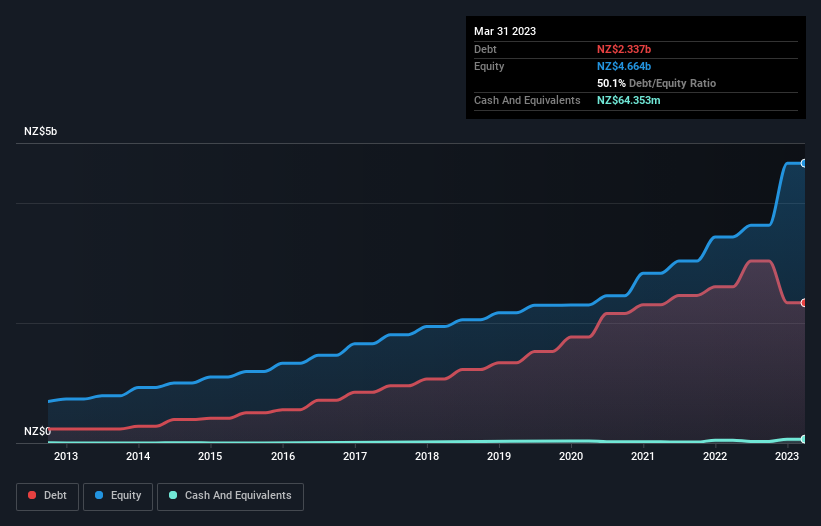- New Zealand
- /
- Healthcare Services
- /
- NZSE:RYM
Ryman Healthcare (NZSE:RYM) Has Debt But No Earnings; Should You Worry?

Warren Buffett famously said, 'Volatility is far from synonymous with risk.' It's only natural to consider a company's balance sheet when you examine how risky it is, since debt is often involved when a business collapses. Importantly, Ryman Healthcare Limited (NZSE:RYM) does carry debt. But is this debt a concern to shareholders?
When Is Debt A Problem?
Generally speaking, debt only becomes a real problem when a company can't easily pay it off, either by raising capital or with its own cash flow. Part and parcel of capitalism is the process of 'creative destruction' where failed businesses are mercilessly liquidated by their bankers. However, a more frequent (but still costly) occurrence is where a company must issue shares at bargain-basement prices, permanently diluting shareholders, just to shore up its balance sheet. Of course, the upside of debt is that it often represents cheap capital, especially when it replaces dilution in a company with the ability to reinvest at high rates of return. When we think about a company's use of debt, we first look at cash and debt together.
Check out our latest analysis for Ryman Healthcare
What Is Ryman Healthcare's Net Debt?
As you can see below, Ryman Healthcare had NZ$2.34b of debt at March 2023, down from NZ$2.60b a year prior. On the flip side, it has NZ$64.4m in cash leading to net debt of about NZ$2.27b.

A Look At Ryman Healthcare's Liabilities
Zooming in on the latest balance sheet data, we can see that Ryman Healthcare had liabilities of NZ$1.21b due within 12 months and liabilities of NZ$6.64b due beyond that. Offsetting these obligations, it had cash of NZ$64.4m as well as receivables valued at NZ$719.1m due within 12 months. So its liabilities outweigh the sum of its cash and (near-term) receivables by NZ$7.06b.
The deficiency here weighs heavily on the NZ$4.62b company itself, as if a child were struggling under the weight of an enormous back-pack full of books, his sports gear, and a trumpet. So we'd watch its balance sheet closely, without a doubt. After all, Ryman Healthcare would likely require a major re-capitalisation if it had to pay its creditors today. When analysing debt levels, the balance sheet is the obvious place to start. But it is future earnings, more than anything, that will determine Ryman Healthcare's ability to maintain a healthy balance sheet going forward. So if you're focused on the future you can check out this free report showing analyst profit forecasts.
In the last year Ryman Healthcare wasn't profitable at an EBIT level, but managed to grow its revenue by 12%, to NZ$569m. We usually like to see faster growth from unprofitable companies, but each to their own.
Caveat Emptor
Over the last twelve months Ryman Healthcare produced an earnings before interest and tax (EBIT) loss. Indeed, it lost NZ$11m at the EBIT level. When we look at that alongside the significant liabilities, we're not particularly confident about the company. We'd want to see some strong near-term improvements before getting too interested in the stock. On the bright side, we note that trailing twelve month EBIT is worse than the free cash flow of NZ$219m and the profit of NZ$258m. So there is definitely a chance that it can improve things in the next few years. The balance sheet is clearly the area to focus on when you are analysing debt. However, not all investment risk resides within the balance sheet - far from it. To that end, you should be aware of the 4 warning signs we've spotted with Ryman Healthcare .
When all is said and done, sometimes its easier to focus on companies that don't even need debt. Readers can access a list of growth stocks with zero net debt 100% free, right now.
New: AI Stock Screener & Alerts
Our new AI Stock Screener scans the market every day to uncover opportunities.
• Dividend Powerhouses (3%+ Yield)
• Undervalued Small Caps with Insider Buying
• High growth Tech and AI Companies
Or build your own from over 50 metrics.
Have feedback on this article? Concerned about the content? Get in touch with us directly. Alternatively, email editorial-team (at) simplywallst.com.
This article by Simply Wall St is general in nature. We provide commentary based on historical data and analyst forecasts only using an unbiased methodology and our articles are not intended to be financial advice. It does not constitute a recommendation to buy or sell any stock, and does not take account of your objectives, or your financial situation. We aim to bring you long-term focused analysis driven by fundamental data. Note that our analysis may not factor in the latest price-sensitive company announcements or qualitative material. Simply Wall St has no position in any stocks mentioned.
About NZSE:RYM
Ryman Healthcare
Develops, owns, and operates integrated retirement villages, rest homes, and hospitals for the elderly people in New Zealand and Australia.
Reasonable growth potential and fair value.
Similar Companies
Market Insights
Community Narratives



